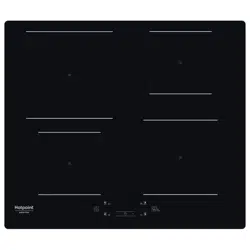Loading ...
Loading ...
Loading ...

INDICATORS
RESIDUAL HEAT
If “H“ appears on the display, this means that the cooking zone is hot. The
indicator lights up even if the zone has not been activated but has been heated
due to the adjacent zones' use or because a hot pot has been placed on it.
When the cooking zone has cooled down, the “H“ disappears.
POT INCORRECTLY POSITIONED OR MISSING
This symbol appears if the pot is not suitable for induction cooking, is not
positioned correctly or is not of an appropriate size for the cooking zone
selected. If no pot is detected within 30seconds of making the selection, the
cooking zone switches o.
Induction hobs may whistle or creak during normal operation
These noises actually come from the cookware and are linked to the pan
bottoms' characteristics (for example, when the bottoms are made from
dierent layers of material or are irregular).
These noises may vary according to the type of cookware used, and the
amount of food, it contains and are not the symptom of something wrong.
SOUNDS PRODUCED DURING OPERATION
CLEANING AND MAINTENANCE
!
WARNING
• Do not use steam cleaning equipment.
• Before cleaning, make sure the cooking zones are switched o and that the residual heat indicator (“H“) is not displayed.
Important:
• Do not use abrasive sponges or scouring pads as they may damage the
glass.
• After each use, clean the hob (when it is cool) to remove any deposits and
stains from food residue.
• A surface that is not kept suitably clean may reduce the sensitivity of
control panel buttons.
• Use a scraper only if residues are stuck to the hob. Follow the scraper
manufacturer's instructions to avoid scratching the glass.
• Sugar or foods with high sugar content can damage the hob and must be
immediately removed.
• Salt, sugar and sand could scratch the glass surface.
• Use a soft cloth, absorbent kitchen paper or a special hob cleaner (follow
the Manufacturer’s instructions).
• Spills of liquid in the cooking zones can cause the pots to move or vibrate.
• After cleaning the hob, dry thoroughly.
COOKING TABLE
POWER LEVEL TYPE OF COOKING
LEVEL USE
(indicating cooking experience and habits)
Maximum power
P Fast heating/Booster
Ideal for rapidly increasing food temperature to a fast boil (for water) or for rapidly
heating cooking liquids.
8 − 9 Frying − boiling Ideal for browning, starting to cook, frying deep frozen products, fast boiling.
High power
7 − 8
Browning − sautéing − boiling −
grilling
Ideal for sautéing, maintaining a lively boil, cooking and grilling (for a short period of
time, 5-10 minutes).
6 − 7
Browning − cooking − stewing −
sautéing − grilling
Ideal for sautéing, maintaining a light boil, cooking and grilling (for a medium period
of time, 10-20 minutes), preheating accessories.
Medium power
4 − 5
Cooking − stewing − sautéing −
grilling
Ideal for stewing, maintaining a gentle boil, cooking (for a long period of time).
Creaming pasta.
3 − 4
Cooking − simmering − thickening
− creaming
Ideal for long-cooking recipes (rice, sauces, roasts, sh) with liquids (e.g. water, wines,
broth, milk), creaming pasta.
2 − 3
Ideal for long-cooking recipes (less than a litre in volume: rice, sauces, roasts, sh) with
liquids (e.g. water, wines, broth, milk).
Low power
1 − 2
Melting − defrosting − keeping food
warm − creaming
Ideal for softening butter, gently melting chocolate, thawing small products and
keeping just-cooked food warm (e.g. sauces, soups, minestrone).
1
Ideal for keeping just-cooked food warm, for creaming risottos and for keeping
serving dishes warm (with induction-suitable accessory).
Zero power 0 Support surface
Hob in stand-by or o mode (possible end-of-cooking residual heat, indicated by
an “H“).
The cooking table oers an example of the cooking type for each power level. The actual delivered power of each power level depends on the cooking zone
dimension.
Loading ...
Loading ...
Loading ...
